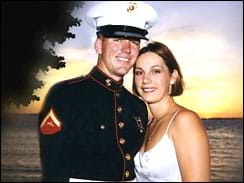It was in February 2002 when Cynthia Sommer and her husband Todd, a Marine, were coming home from a family weekend at an amusement park. With their four children, Cynthia and Todd were the very picture of happiness.
But as Bill Lagattuta reports, no one could have predicted the rollercoaster ride was just beginning.
"Came back home on Sunday, got the kids to bed. And he said that his heart felt like it had fluttered. I said, 'Should we go to the hospital?' He said 'No, I'm fine. I'm just gonna go to bed,'" Cynthia remembers.
Hours later, she made a panicked 911 call, when Todd collapsed in the middle of the night in their home. When Todd was pronounced dead a couple of hours later at the hospital, it seemed his heart had just given out.
"They explained it the same as - hear of kids playing baseball and just falling over, that there's no symptoms, there's no warning sign, there's nothing,'" Cynthia remembers.
But there was something: Todd had started feeling sick ten days before he died. His symptoms had started on Friday, Feb. 8.
Cynthia says the next day, Saturday, her husband exhibited signs of food poisoning. She says Todd had told her he had eaten egg rolls.
On Sunday, Todd went to the base clinic, where a doctor thought it might be food poisoning and told him to wait it out. But when his symptoms got worse, Cynthia appeared frustrated.
"The conversation would be, 'Mom, Todd’s fever is up to 102. What should I do?' And, 'I just can’t stop him from throwing up,' and, 'What else can I give him?'" Cynthia's mother Jan Lippert remembers. "I'd tell her the usual mother’s remedies."
Desperate for an answer to what was wrong, Todd went back to the doctor two days later. Cynthia says they gave Todd IV fluids and prescription medications.
And by that Saturday, Feb. 16, he seemed to make a miraculous recovery, well enough for that family outing to the amusement park.
But 48 hours later he would be dead.
Cynthia's mother rushed to be by her daughter's side. "It was a scene that I will never in my entire life forget. She was upstairs in their bed and she had one of Todd's shirts," Jan recalls. "She was just clinging onto his shirt, and saying how it smelled like Todd and this is all she had left of him, that he was gone."
The couple had met three years earlier when Todd was just 19, and Cynthia was a 25-year-old divorced mother of three.
Within six months, Todd and Cynthia were married in the Florida Keys, where Todd grew up. They set out for the West Coast, where Todd was assigned to the Marine Corps Air Station Miramar in San Diego. The newlyweds soon added another member to their family.
After Todd's death, Cynthia's life would never be the same. The Naval Criminal Investigative Service opened an investigation into the death, something they do whenever someone in the military dies. As the investigation began, NCIS agents found nothing unusual. The official cause of death was cardiac arrhythmia - Todd's heart had simply stopped beating.
A year later, as the shock of Todd's death wore off, Cynthia had moved on. She and the children had begun a new life in Florida with a new boyfriend. Almost everyone had accepted the explanation that a healthy young Marine had suddenly collapsed and died at the age of 23.
Almost everyone accepted it, but not NCIS special agent Mark Ridley. "There were some odd things goin’ on with the investigation that I thought needed additional work," he says.
Ridley was the man in charge of Todd's death review panel, an NCIS process of making sure all leads are pursued in military deaths, especially when someone so young dies unexpectedly. "They were lookin' at the case as being a natural death from the beginning," Ridley says.
Ridley felt the autopsy had overlooked important clues - those symptoms Todd was suffering in the days before he died. "When you look through the medical record it showed that he had vomited several times, maybe 12 to 15 times in the space of a short period of time," he says.
Ridley suspected that Todd's symptoms and sudden death were related. It reminded him of a 1986 poisoning case in North Carolina that he learned about during his training days. "It just so happens that Todd Sommer was exhibiting some of the same things that were found in the victims associated with the Blanche Taylor Moore case," Ridley explains. "It resonated with me and when I read that case file it just made me a little bit uncomfortable."
Rather than close the investigation, Ridley ordered a rare heavy metals test on Todd's tissue samples, which had been removed during the autopsy. If Todd had been poisoned, NCIS investigators had a lot of questions.
Source: cbsnews







